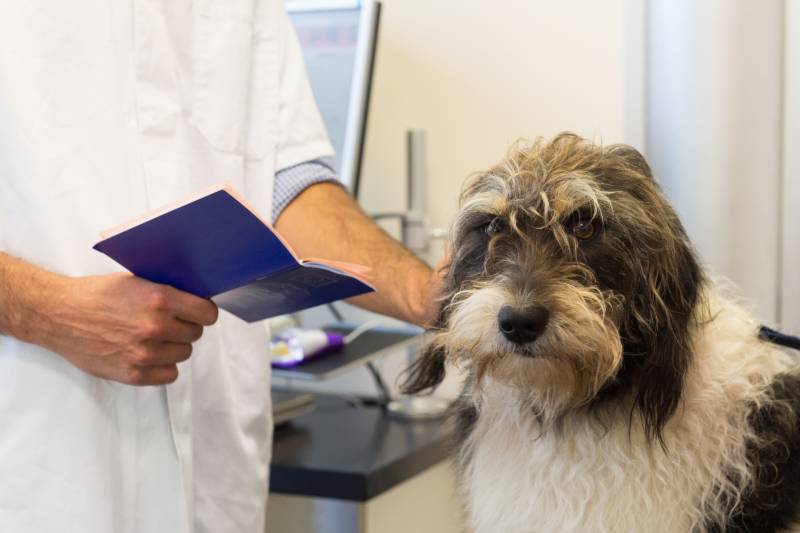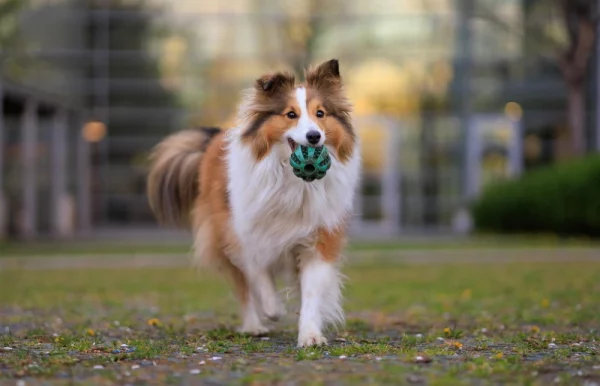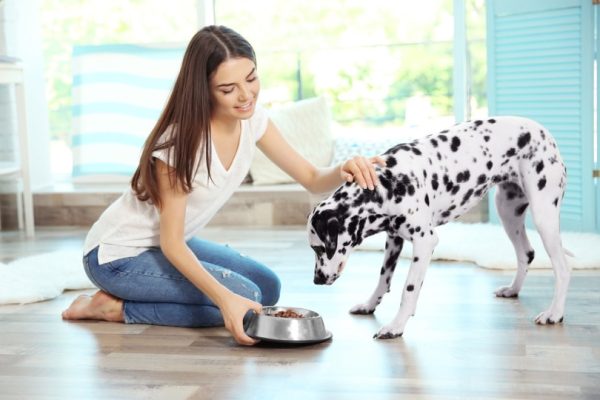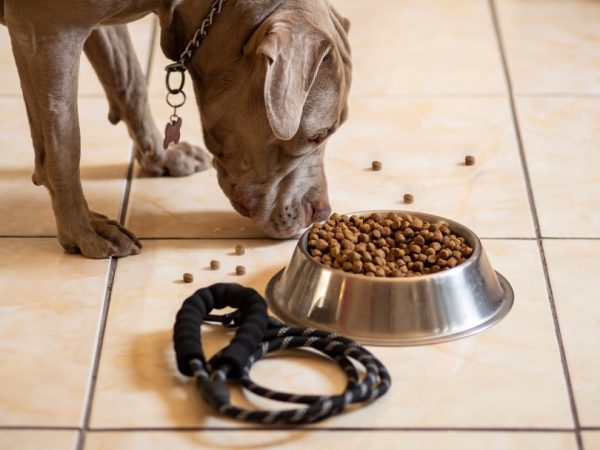In this article
Down syndrome in humans causes cognitive delays and a higher risk for several health issues and is characterized by several physical traits. As the prevalence of Down syndrome continues to increase in America,1 one question that many have is whether dogs can have Down syndrome. While congenital and genetic diseases do exist in dogs, Down syndrome cannot occur and has never been diagnosed in canines.
But why can’t dogs have Down syndrome, and are there any other conditions that mimic it? To learn the answers to these questions and several others, continue reading.

Why Can’t Dogs Have Down Syndrome?
Although there are certainly similarities between the genetics of dogs and humans, specific differences eliminate the chance that a dog can have Down syndrome. The biggest difference is that humans have 23 pairs of chromosomes, while dogs have 39. Also, since Down syndrome affects the 21st chromosome pair in humans, and the 21st pair in dogs controls different aspects of their health, it’s impossible for dogs to have Down syndrome the same way that humans do.2
Although dogs can have chromosomal abnormalities, their DNA is different enough from humans that Down syndrome has never been reported in canine species.

Can Dogs Show Signs That Are Similar to Down Syndrome?
While Down syndrome has never been identified in canines, they can suffer from similar congenital issues. Growth hormone deficiency in dogs is one example, as is pituitary dwarfism.
Hypothyroidism is one of the most common congenital conditions in dogs. It has several signs that are quite similar to Down syndrome in humans, including the following:
- Slower than normal growth
- Stunted growth
- Shorter legs
- A delay in the opening of a puppy’s eyes and ears
- A distinct lack of muscle tone
- An abnormally large tongue that protrudes from the dog’s mouth
When Should You See a Vet if Your Dog Shows Signs of a Congenital Disease?
As we’ve seen, dogs can’t have Down syndrome as defined in people due to the chromosomal differences between canines and humans. However, since dogs can have congenital issues and show similar signs, it’s essential to know when to seek veterinary advice. If you see the following signs in your canine, take your pup to your local vet for a complete check-up.
- Poor muscle tone with difficulty walking
- Slow growth
- Shorter limbs than normal for the breed
- Eye and ear issues
- Skin issues
- Irregular facial structure or features for the breed
- Delayed development, both physically and mentally
If you need to speak with a vet but can't get to one, head over to PangoVet. It's our online service where you can talk to a vet online and get the advice you need for your dog — all at an affordable price!


What Causes Down Syndrome-Like Signs in Dogs and Other Animals?
While research doesn’t point to one specific case, it’s believed that overbreeding—and specifically, inbreeding—may be one of the leading causes of Down syndrome-like signs and issues in dogs and other animals. Inbreeding has been shown to cause a higher incidence of genetic defects involving chromosomes.
Which Conditions Can Mimic Down Syndrome in Dogs?
Certain conditions that affect dogs can have similar signs to Down syndrome. The three most common conditions that mimic the signs of Down syndrome in dogs are as follows.
1. Congenital Hypothyroidism
Congenital hypothyroidism is a rare condition in which a dog’s thyroid gland doesn’t produce the requisite number of hormones necessary for growth and other physical and mental health aspects. This can lead to dwarfism and cognitive issues in dogs, among other signs.
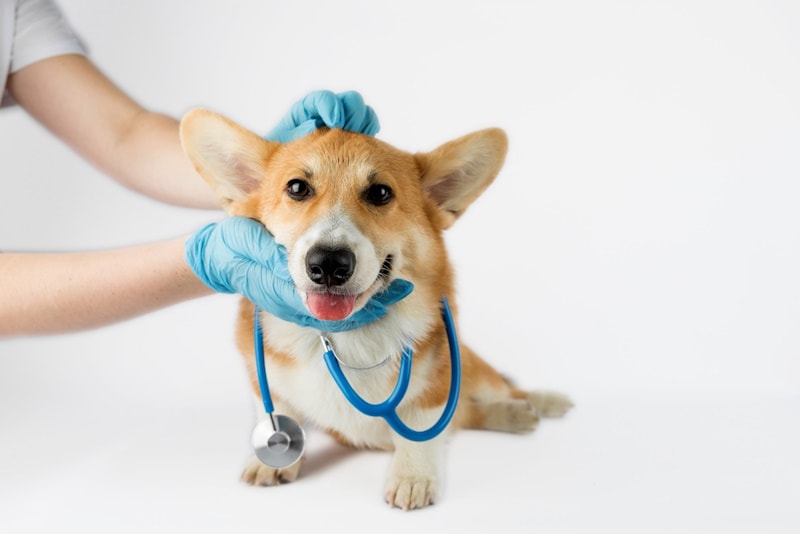
2. Pituitary Dwarfism
As with congenital hypothyroidism, pituitary dwarfism is caused when a dog’s pituitary gland doesn’t produce enough growth hormone or produces it in amounts well below normal levels. This causes a dog to be much smaller than average and in many cases, will significantly reduce their lifespan. In some situations, the vet might be able to provide the dog with hormone supplementation.
3. Congenital Hydrocephalus
This congenital issue causes a dog to have an unusually large skull and eye-position anomalies. The spinal fluid accumulates in and around the skull. Some dogs will have few signs that they are affected by this condition, but other dogs can be affected more severely, including having seizures and possible blindness.
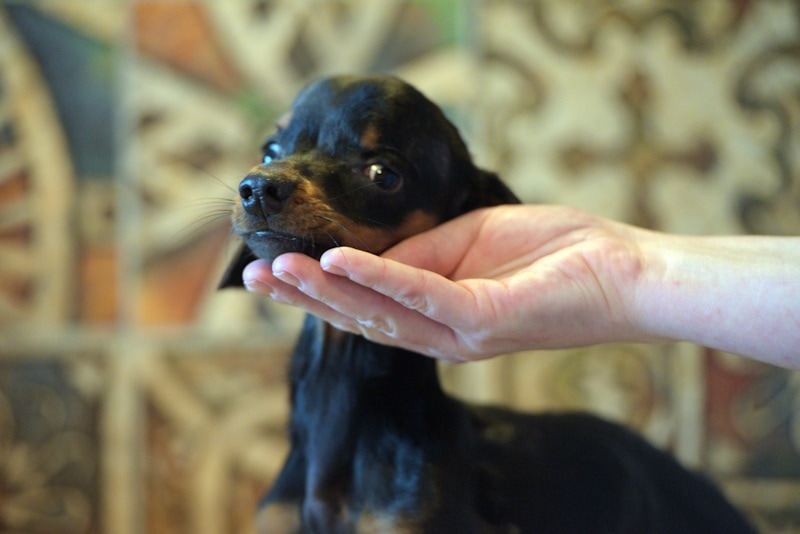
Can Other Animals Have Down Syndrome?
Down syndrome doesn’t occur in any animals except primates. The reason is simple: Primates have a chromosomal system similar to humans.
Humans have 23 pairs of chromosomes, while primates have 24 pairs. It’s been shown that the 22nd chromosome in primates is almost identical to the 21st in humans. Researchers have also noted that when a primate has an issue with its 22nd chromosome, it exhibits similar signs to a human with Down syndrome, including eye and ear issues, strabismus, and growth issues. Besides primates, however, the chromosomes of most other animals are different enough from humans to preclude any chance of Down syndrome.

Final Thoughts
Due to the significant difference between the DNA and chromosomes of people and canines, dogs have never been diagnosed with Down syndrome. Instead of the 23 pairs of chromosomes that we humans have, dogs have 39. The 21st chromosome, which causes the issue in humans, is different in dogs and affects other parts of their physical and mental health. It can be defective but won’t cause the same condition or signs. However, dogs can have other congenital abnormalities, and experts believe that most are caused by inbreeding.
See Also:
Featured Image Credit: Ivonne Wierink, Shutterstock

